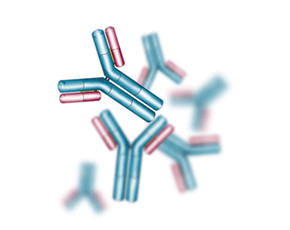
Methods:
Adult patients with RA and a DAS28 of at least 3.2 started on treatment with adalimumab at 40mg every other week (+/- concomitant synthetic DMARD therapy) were enrolled in this study. Disease activity was measured by DAS28 at baseline and at 9 time points over three years (while on adalimumab). Minimal disease activity was defined as a DAS28 <3.2 at all consecutive measurements after a certain time point. Remission was defined as DAS28 <2.6 at all consecutive measurements after a certain time point. Discontinuation of adalimumab or dropout of the study was also an outcome parameter. Trough adalimumab serum concentrations and antidrug (anti-adalimumab antibodies) were measured at the same time points as DAS28.
Results:
272 patients were enrolled in the study, and 55% completed the entire follow up time of 3 years. Anti-adalimumab (antidrug antibodies) were detected in 76 (28%) patients, the majority of which developed these antibodies during the first 28 weeks of treatment (67%). Of the patients with anti-adalimumab antibodies, 38% discontinued participation during follow up because of treatment failure, 10% for adverse events, 3% because of treatment failure and adverse events combined, and 12% for other reasons. Patients with anti-adalimumab antibodies more often discontinued study participation compared to those who were anti-adalimumab antibody negative, even after adjustment for methotrexate use, number of previous DMARDs, and CRP (HR 3.0; 95% CI 1.6-5.5). Patients with anti-adalimumab antibodies had a higher DAS28 score at all time points compared with anti-adalimumab antibody negative patients, even after adjustment for ESR, MTX dose, and age (0.4; 95% CI 0.2-0.6). Patients with anti-adalimumab antibodies were less likely to achieve sustained minimal disease activity (HR 3.6, 95% CI 1.8-7.2) and were less likely to achieve sustained remission (HR 7.1; 95% CI 2.1-23.4).
Conclusions:
In this study, the development of antidrug antibodies to adalimumab was associated with increased rates of discontinuation of treatment and increased disease activity. These antibodies were most likely to develop during the first 28 weeks of treatment.
Editorial Comment:
The immunogenicity of biologic agents is a well-established phenomenon, but the clinical implications of such are not clear. Gaining an understanding of how antidrug antibodies influence clinical response to a biologic agent can potentially have important ramifications in a RA patient’s treatment plan by influencing provider’s decisions to switch therapy. For example, extrapolating from these data, if a patient is showing a poor response to adalimumab and has developed anti-adalimumab antibodies, this may strongly influence the provider to swiftly switch to another agent. Further, the development of antidrug antibodies may explain why some patients develop a ‘tolerance’ to therapy, particularly with periods of drug discontinuation (and then re-initiation). We do not know why some patients develop antidrug antibodies and others do not. This is an important area of investigation, as understanding this process may allow us to tailor therapy at the time of drug initiation. Further investigation in this field is underway and exciting as we come closer to understanding how to optimally and efficiently treat RA.

